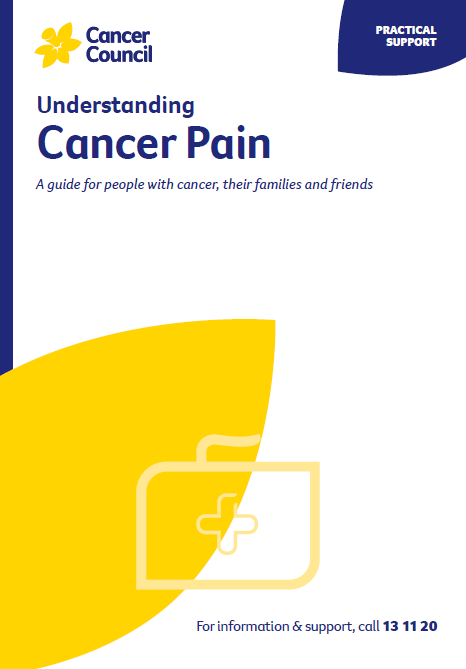- Home
- About Cancer
- Managing side effects
- Pain and cancer
- Describing pain
- Ways to describe your pain
Ways to describe your pain
You can use different scales to describe your pain and how it is affecting you. These can help your health care team find the best pain control methods for you.
Learn more about:
Use a pain scale
Some people rate the level of pain on a scale. There are different kinds of scales.
| Word scale | Number scale | Activity tolerance scale | Facial scale |
| rates the pain from none or mild through to moderate or severe | rates the pain from 1–10; the higher the number, the worse the pain | rates how much the pain affects what you can do, e.g. thinking, walking or carrying things | uses facial expressions to show how the pain makes you feel |
| no pain | 0, 1 | no pain | |
| mild pain | 2 | can be ignored | |
| moderate pain | 3, 4 | interferes with tasks | |
| moderate pain | 5, 6 | interferes with concentration | |
| severe pain | 7, 8 | interferes with basic needs | |
| worst pain possible | 9, 10 | bed rest required | |
Strategies to help
Make a note of triggersWrite down what seems to cause or increase your pain. This is called a trigger, and it may be a specific activity or situation. Knowing what triggers your pain might help you find ways to manage these triggers. | |
Keep a pain diaryA written record of your pain can help you and those caring for you understand more about your pain and how it can be managed. Note down how the pain feels at different times of the day, what you have tried for relief and how it has worked. Some people track their pain using an app on a mobile device, such as a smartphone or tablet. | |
Keep a contact listMake a list of the health professionals in your team and their contact details. Keep this handy in case you (or your carer) need to get in touch. | |
When to seek helpTalk to your doctors about what should prompt you to call them and who you can call, particularly after hours. For example, you may be instructed to call if you need to take four or more doses ofbreakthrough pain relief u are feeling very sick or sleepy. |
→ READ MORE: Using pain medicines
Podcast: Managing Cancer Pain
Listen to more episodes from our podcast for people affected by cancer
More resources
Professor Paul Glare, Chair of Pain Medicine, Northern Clinical School, Faculty of Medicine and Health, The University of Sydney, NSW (clinical update); Dr Tim Hucker, Pain Specialist, Northern Beaches Hospital, Director, Northern Beaches Pain Management, NSW (clinical update); Dr Keiron Bradley, Palliative Care Consultant, Bethesda Health Care, WA; A/Prof Anne Burke, Co-Director Psychology, Central Adelaide Local Health Network, President, Australian Pain Society, Statewide Chronic Pain Clinical Network, SA, School of Psychology, The University of Adelaide, SA; Tumelo Dube, Accredited Pain Physiotherapist, Michael J Cousins Pain Management and Research Centre, Royal North Shore Hospital, NSW; Prof Paul Glare (see above); Andrew Greig, Consumer; Annette Lindley, Consumer; Prof Melanie Lovell, Palliative Care Specialist HammondCare, Sydney Medical School and The University of Technology Sydney, NSW; Caitriona Nienaber, 13 11 20 Consultant, Cancer Council WA; Melanie Proper, Pain Management Specialist Nurse Practitioner, Royal Brisbane and Women’s Hospital, QLD; Dr Alison White, Palliative Medicine Specialist and Director of Hospice and Palliative Care Services, St John of God Health Care, WA.
View the Cancer Council NSW editorial policy.
View all publications or call 13 11 20 for free printed copies.

